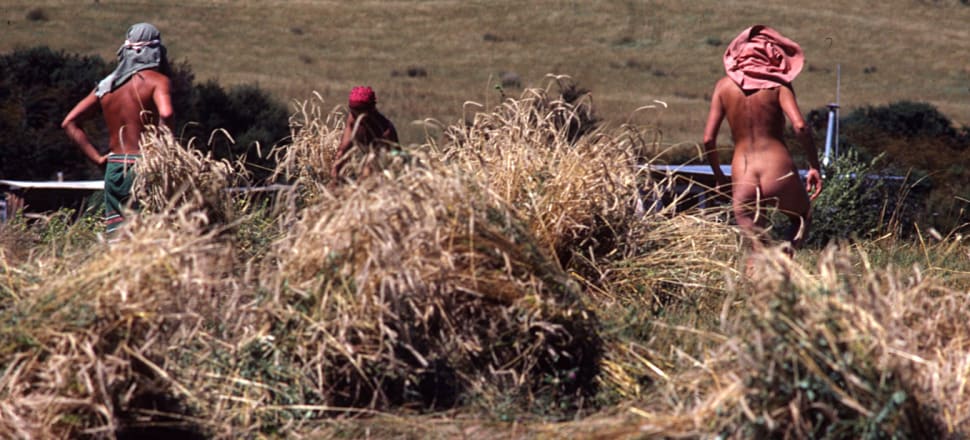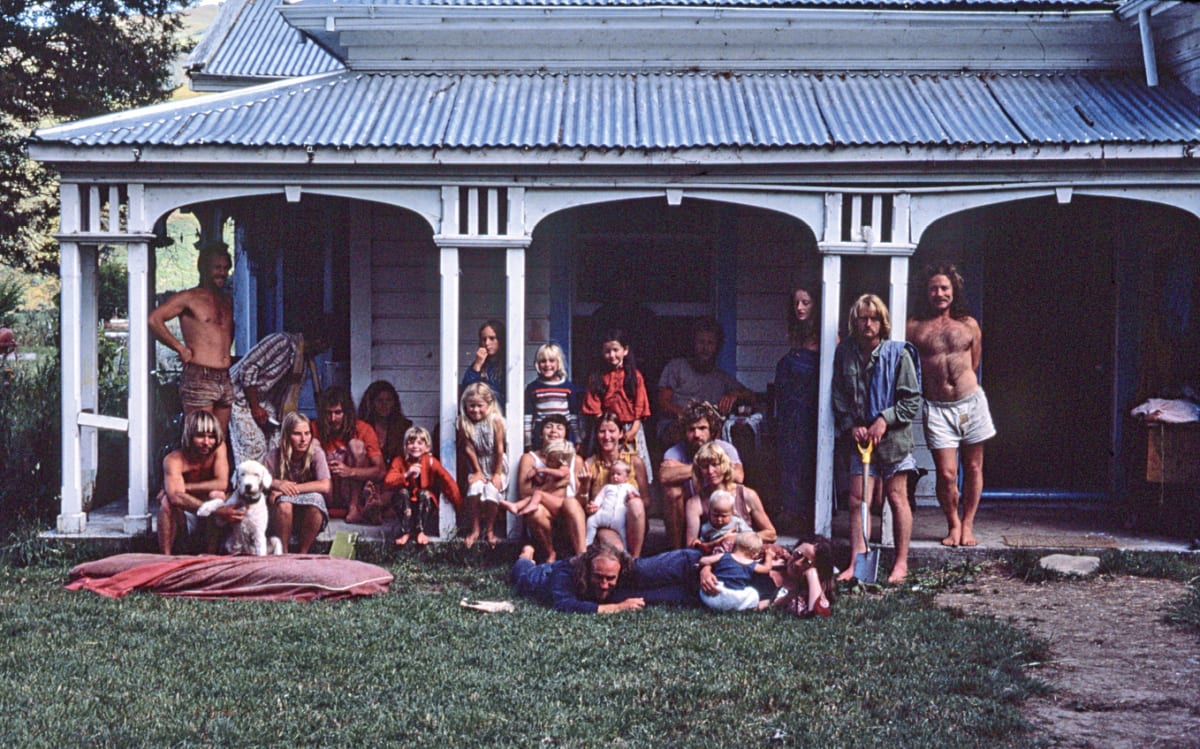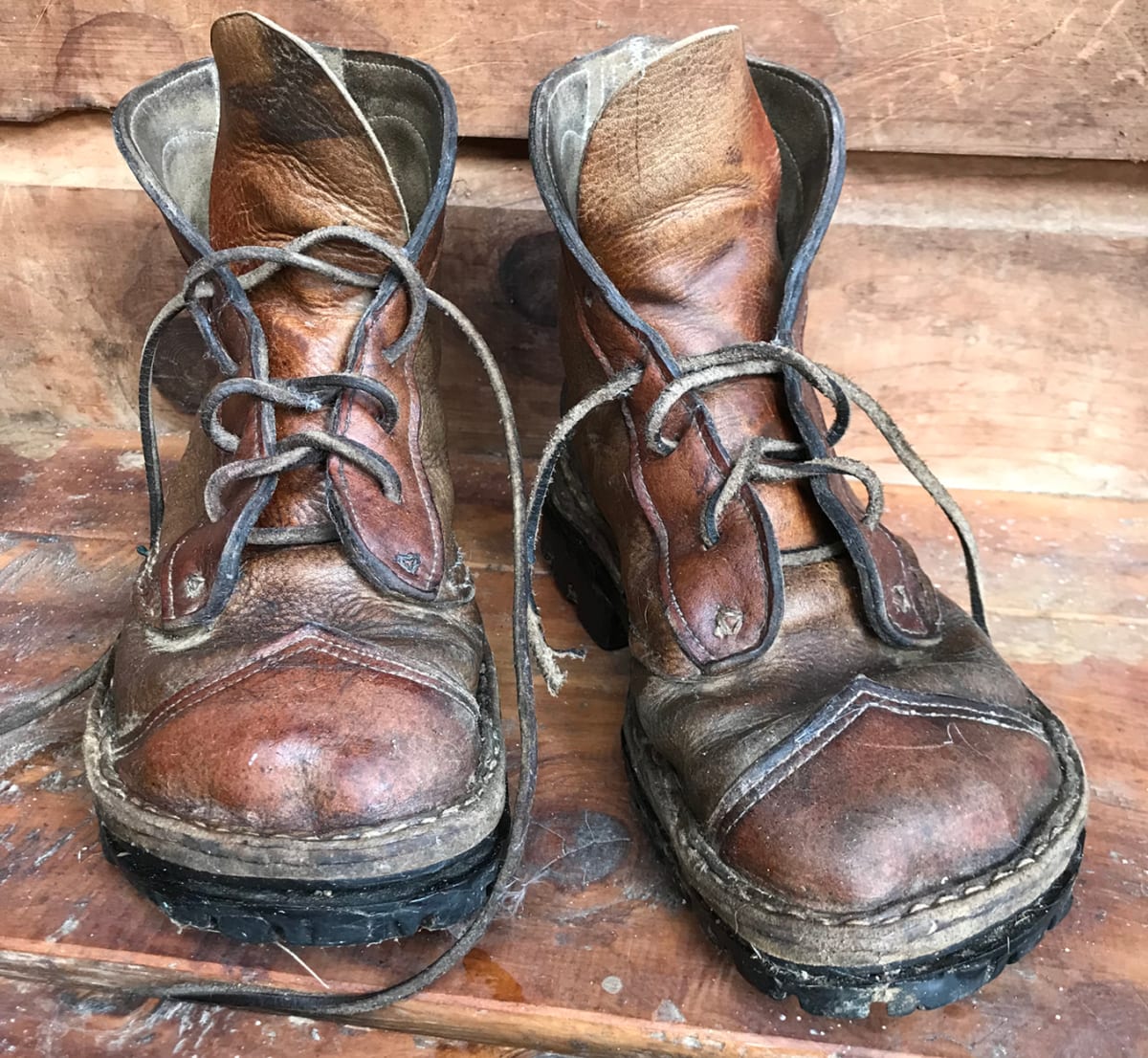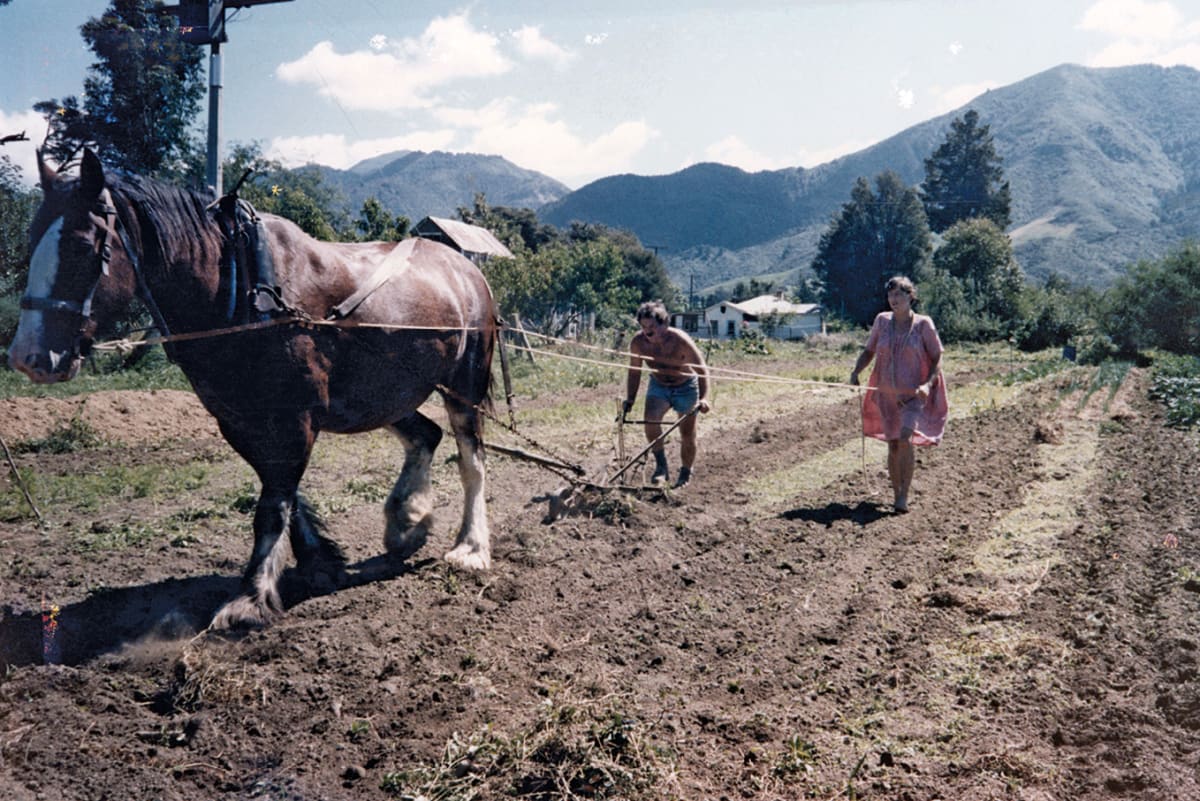
On the memoir of a can-do, plain-speaking, Amazonian farmer who was at the centre of New Zealand's commune experiment In 1980 or thereabouts I passed the author at the Tahuna Farm commune, and then at another community at Graham Downs commune where my father and sister lived. In both places, Olive Jones appeared at the centre of things, a "key person", as she describes it in her new book Commune: Chasing a utopian dream in Aoteoroa. I was just out of adolescence. Olive was only a few years older than me, but nevertheless appeared glaringly adult—committed, busy, deadpan.
Out with the horses, in for smoko with the men after plowing the fields, ever in motion, Olive was magnetically androgynous, seriously can-do, an Amazonian other. She was very visibly a pioneer of the rural counterculture. I sensed she possessed agency, although we didn’t call it that then. ‘Assertive’ was the aspiration for young, would-be feminists of my generation.
In her enthralling part auto-anthropology, part memoir, part green-agricultural procedural, Olive herself is a compelling correspondent: clear-eyed, plain-speaking, with a stealth humour directed at the many absurdities of groups of people living in an anarchist-informed environment. The commune at Graham Downs was defined by an idealistic open-door policy that welcomed the ‘People of New Zealand’. This included: a core membership of those who wish to create alternative ways of living and being from the ground up; international itinerants on the word-of-mouth-circuit, and those on the outer fringes of society with nowhere left to go—the needy and the opportunist. Olive tackles the thorny thematic question of who was up to practicing the rigours of responsible self-governance—and who wasn’t.
In many ways, Commune is a love story. Her object of desire is the land and its gifts, and in close second place, an elusive collective noun—the ‘we’ that communal experience aspires to. Olive offers the reader a passionate and troubled account of these things as commune and narrator grow up in the late 1970s, mature in the 80s and begin a long slow fragmentation in the 90s and on. As an unusually sympathetic local council is quoted as saying, Graham Downs endeavoured to enact a "new social order with high ideals", and for a while, before it all went bad, Olive and her cohort came close to achieving that dream.
To rewind: in 1977 Dominion Breweries reclaimed the land they had formerly leased to the Nelson commune Tahuna Farm, and in response a young Olive Jones found herself a founding member of Motueka’s Graham Downs. Camping out alone on the river-terrace that the purpose-formed trust was in the process of buying, she soaks in its possibilities before her fellows arrive, and funds her stay picking tobacco at the farm down the road. Reading these passages, it is hard to resist the ironic thought that the indubitably rugged author has become something of the Marlboro Man that, growing up restless in Tauranga, she fantasised about. If she wasn’t going to fuck him, she was going to be him! And if the author is surely more doer than icon, she is both on Commune’s cover. Muscular and tan, reins lightly held as she sits astride hay bales stacked on a horse-drawn dray.
In her unfolding story, tent is followed by tent-with-wooden-floor, then self-built house and a dozen-plus years of heady communal dancing and dining, accompanied by the constant hard graft of green farming and learning on the job. Indefatigable idealism is followed by its slowly lengthening shadow, disillusion. Jones was a self-described communard who engaged in nude agriculture (‘"We hadn’t heard of skin cancer.") Some winters she funded her $15 a week to cover the cost of life at Graham Downs with stints as a prostitute in Christchurch.

Her book easily and charmingly moves from physical scene-setting to the drama of encounter and relationship, to philosophical reflection and introspection. She deconstructs the sexual asymmetries of her own rural corner of Aotearoa counterculture too. Returning home from her first, comically unfinished encounter with prostitution (unsolicited) on Tahuna beach, she encounters disapproval. That streak of puritanism I remember so well from my own Aotearoa upbringing is reframed here as a ‘letting the sisterhood down’ vibe. This leads her to muse on the parallels between the casual sex aka free love routinely practised in the movement, and paid sex: "Free love and paid sex were two sides of the same thing, only paid sex had more financial rewards."
Here she is usefully spelling out the math: "The price of a fuck in the mid-1970s was around $60. And that was for less than half an hour of contact, often only 10 or 15 minutes, tax-free. It was an immense sum of money when you compared it with the average hourly wage for unskilled labour, which was around $5 before tax." Ultimately, she becomes ambivalent about prostitution. Its splitting of love and intimacy from sex finally bugs her too much to continue.
Her early, confusing encounters with free love unearth other hypocrisies. In practice, Olive observes, the men freer to take multiple lovers than the women and lighter on consequence (birth, childcare and attendant domestic drudgery). Later, from deep inside the Graham Valley experience, she notes that certain jobs—carried out minus the modcons of their mothers—attract the same old sexist status ranking: "Observing the women scrubbing clothes by hand also brought home to me that despite this being called an alternative lifestyle…traditional roles of men and women remained fairly entrenched. There seemed to be a clear division of labour; men worked the horses and grew the crops and sorted out the water system, built the farm buildings and modified the house. Women spent hours in the washhouse or in the main house preparing meals, cleaning, caring for the children and weeding the vegetable gardens…The women took responsibility for keeping everyone fed, clean and well in a rudimentary pioneering environment…and the areas of labour that were male dominated tended to be more visible and had higher status than the invisible daily domestic tasks that consumed long hours of labour by women."
In my experience, this analysis is almost a truism of much so-called counterculture experience, one we occasionally noted at the time. Yes, I was briefly a communard too. And, the counterculture was often as gendered as the culture which it was supposed to be countering. Refreshingly, the book also features Olive giving the lie to this in the zeal with which she skips the laundry—and for a while the reproduction that generates it —and makes and does everything else instead. The milking and all its artisanal by-products—butter, cheese, yoghurt, buttermilk (her pride and joy, the diary); dinner for thirty most nights; her handmade working boots; her house.

The DIY fails of the sustainable life are at least as interesting and provide more black comedy than the successes. A failed trip up the valley to have the heifer inseminated by a bunch of fence-vaulting Hereford Bulls is a western gone scarily wrong…The agony of inept kills of individual stock by the resident men eventually result in a professional being called in for more merciful dispatch…Olive fills in at a birth with a psychotic husband off his meds in disconcertingly close attendance. "Fuck! Don’t give him the scissors"’, thinks Olive when the belated midwife arrives and offers these to Warren to cut the placenta. There’s a lot to like and admire about Olive.
Cops provide comically bemused walk-on roles versus the more usual bad-guy counterculture tropes. At Tahuna, the police "stand uncomfortably at the edge of a field where some of us were working to ask politely from a distance would we mind putting our clothes on because the neighbours had complained." They are called out to deal with Bryan, "a talented artist who had schizophrenia, and who had walked into [a neighbours’] house after dinner one evening while they were watching television and derided them for their tasteless choice of art on their walls." The details are killingly good here. Recognising Tahuna’s place in "providing food and shelter to people who might otherwise be on the streets", the police are mostly friendly and supportive. At Graham Downs, they provide transport when marijuana-induced psychosis means a resident needs to be sectioned. (Warren again). The drug squad swooping down in their Iroquois helicopter are…not so friendly.
Other, more mundane citations lend a microcosmic view. Quoted minutes from a meeting where everyone agrees to not agree and actionable outcomes are nil capture the challenges of anarchy and rule by (non)consensus. You don’t have to be an ex-communard to get this stuff. You might serve on a committee or board, or work in an office, or write short scripts for theatre of the absurd, or be a student of political philosophy. You might do none of these, and still find the stubbornly opining voices thus transcribed a cringe-ly familiar peephole into the human condition.
TRUSTEES:
- Klaus would like trustees to be totally outsiders. Trustees on the property might be biased
- Trustees off the property might not be up with the play.
- A balance might be a good thing.
- Length of tenure: some thought trustees should have a limited tenure.
- This might mean trustees will not keep up with the play.
In the early 90s, Olive makes the tough call to leave a commune devolving at the hands of a post-hippie generation who could care less about collective values or the land but dribble up the drive anyway to take advantage of the cheap living. In 2006, she returns on a teachers fellowship to research a book originally conceived as an oral history. Right before publication, she is back to complete Commune, now with the invaluable ‘I ‘of her own experience at the centre. Newly appointed trustee, she is also there to shepherd the land’s regeneration after its dissolution at the hands of the ‘lost generation.
And so, to the miserablist Dwaynes and Justins and Shanes, as she profiles the men who belong to the final, tragic act of this modern-day pioneer epic: "Attempts were made to encourage people to get involved in the farm, and to spell out a minimum expectation for being there, but they were of a different mindset and value system. They’d found a place where nothing was compulsory; you didn’t have to pay anything to stay and no one made you do anything. The voluntary aspect of contribution, for them, just meant ‘you don’t have to’. So they didn’t. They just hung out, collected the dole, enjoyed the largesse of the place and regularly got pissed."

The lost generation often hailed from Auckland, wore black, and besides getting out of it all the time, collected hard dogs on chains. Not communards or hippies, then. Graham Downs had previously been welfare-free bar the odd solo parent on the benefit. With the dole came supermarket shopping, alcohol that none could previously afford, litter and skips of unfamiliar plastic waste. Consumption and capitalism get an arid grip on a farm that had been sustainably feeding its citizens for a generation. They even made their own salami! Resident intellectual John Glasgow characterises it thus: with the dole, anarchy became disorder. I recall this man with the glittering gaze on visits to my father. A palpable key person he was. In Commune, his role in Olive’s introduction into the sexual mores of this world is another period capsule. You’ll have to read the book to find out about that. To its credit, Commune does what the best stories do, it opens out a previously unknown world and lets us see inside. Inside that world, I reacquainted with my father, writer Norman Bilbrough, since passed, and my sister, in a period of their lives I was not around for. In one of the many cameos that pepper the book, Olive paraphrases my father’s gratitude to that time and place: "Norman felt that there was enormous goodwill extended towards him. It helped that he took responsibility to make sure there was a meal every night; if no one else was cooking, he would step in and make a simple meal for everyone. He described ‘this whole law-of-manifestation thing’, in which, at times when the garden wasn’t producing much, something would appear. He remembers one afternoon, there was nothing much to cook until Jim and Jamie turned up with a whole lot of pumpkins they’d found at the Ngātīmoti tip. "
It wasn’t only my father who sometimes reached for the law of divine or cosmic manifestation as it was then referred to. It was a thing, an inner logic gracefully counted on in a world that, for a decade or so, managed to sidestep that force that has such lamentable overreach in our lives now, the market aka late capitalism. In memorialising that time and place with such tender, puncturing regard, Olive brings it vividly to life for those that were there and those that weren’t. For the People of New Zealand… Commune: Chasing a Utopian Dream in Aotearoa by Olive Jones (Potton & Burton, $40) is available in bookstores nationwide







